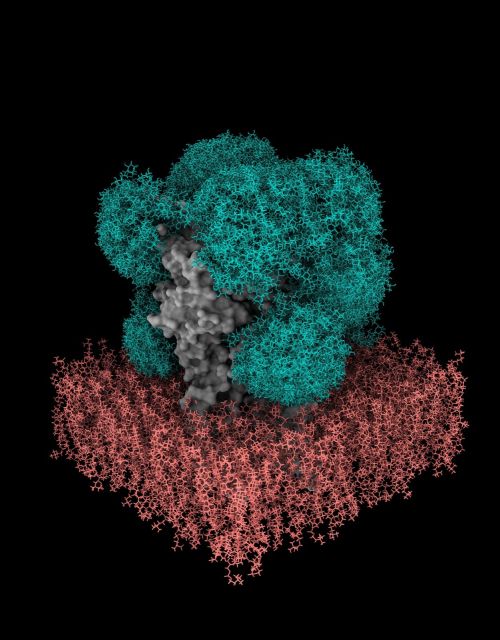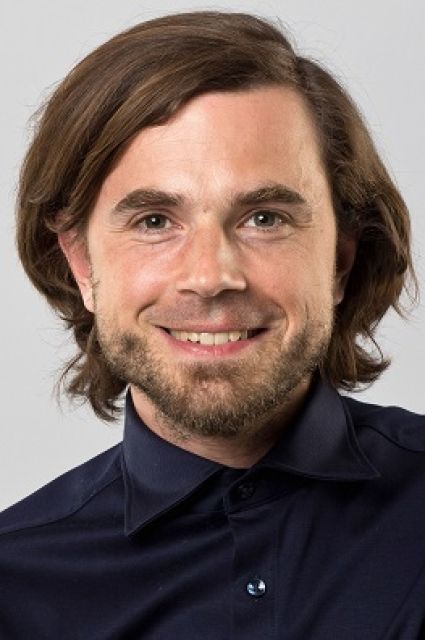Dr Mateusz Sikora, Head of the Dioscuri Centre at the Małopolska Centre for Biotechnology, Jagiellonian University, has developed a revolutionary method for the fast visualisation of proteins and sugars, which relies on GlycoSHIELD, an algorithm created within the framework of Polish-German scientific cooperation under the Dioscuri Programme. The paper that describes the algorithm was just published in the prestigious journal “Cell".
 Sugar chains (glycans) that coat the surface of proteins in our bodies also influence how they interact with other molecules. This is why a robust understanding of glycans plays such an important role, e.g., in new drug development. Because of their mobility and variability, experimental research into sugars is very complex. Computer simulations that allow imaging of how glycans coat proteins normally require hundreds of thousands of hours on purpose-built supercomputers, which means they cannot be routinely used in the process of new drug development.
Sugar chains (glycans) that coat the surface of proteins in our bodies also influence how they interact with other molecules. This is why a robust understanding of glycans plays such an important role, e.g., in new drug development. Because of their mobility and variability, experimental research into sugars is very complex. Computer simulations that allow imaging of how glycans coat proteins normally require hundreds of thousands of hours on purpose-built supercomputers, which means they cannot be routinely used in the process of new drug development.
A solution to these challenges has now been proposed: GlycoSHIELD, a very efficient algorithm that takes just minutes to predict how sugars will behave on protein surfaces. It was developed within the framework of Polish-German cooperation at the Max Planck Dioscuri Centre established in 2023 at the Małopolska Centre for Biotechnology at the Jagiellonian University. The centre is headed by Dr Mateusz Sikora, who previously completed a postdoctoral fellowship at the Max Planck Institute of Biophysics. On the German side, Dr Sikora has partnered up with a team led by Prof. Gerhard Hummer from the Max Planck Institute of Biophysics in Frankfurt. The research project has also involved contributions from the Taiwanese Academia Sinica, the French Inserm Insitute, and the University of Bremen, Germany. The scientists have just published their method in the prestigious “Cell” journal.

Dr Sikora emphasises: “Our approach reduces resources, computing time and the necessary technical expertise. Anyone can now calculate the arrangement and dynamics of sugar molecules on proteins on their personal computer or our online app within minutes. There is no need for specialist knowledge or high-performance computers”. The software may help develop new vaccines, drugs and advanced therapies, such as, for instance, cancer immunotherapy.
Dioscuri programme
The Dioscuri Programme was launched on the initiative of the Max Planck Society with an aim to create research teams throughout Central and Eastern Europe that would be able to compete with teams at the international level.
Four calls for proposals for the establishment of Dioscuri Centres of Scientific Excellence in Poland have been announced thus far, with 8 out of 114 submitted proposals selected for funding. Scientific excellence is the only assessment criterion under the call. The exceptional programme has attracted eight young researchers to come to Poland; they have received funding to set up and develop independent research groups in the form of Dioscuri Centres in the country. To date, five Dioscuri Centres have been established at PAS institutes in Warsaw; three more are active at the Jagiellonian University, Kraków. Each Dioscuri Centre receives 1.5 million euro in funding over five years. The costs are split evenly between the Ministry of Science and Higher Education (previously: Ministry of Education and Science) and the Ministry of Education and Scientific Research of the Federal Republic of Germany, while host institutions in Poland provide the necessary research infrastructure.
The Dioscuri Programme was implemented in cooperation with the National Science Centre from 2017 onward, until it was suspended by the decision of the previous Minister of Education and Science. The NCN continues to reassert its readiness to organise the last iteration of the Dioscuri call.
Dioscuri Centres opening at the Jagiellonian University
NCN podcast vol. 6: Dioscuri Centres, in which winners of the first Dioscuri call, concluded in 2018, talk about their research.
